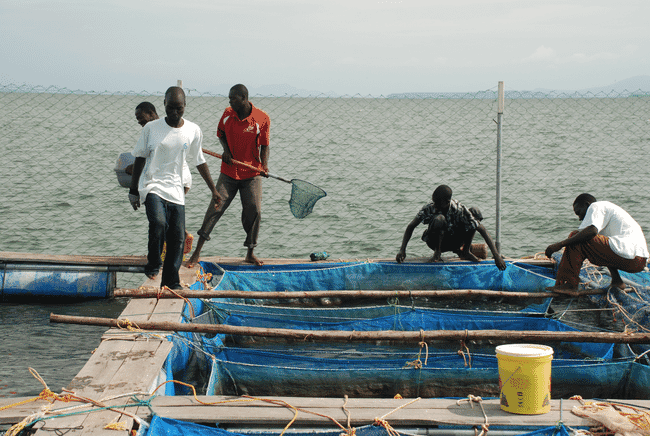
© Will Leschen
While farmed fish production is rising, wild freshwater species, essential to food security and ecological stability, are under severe threat from habitat loss, overfishing and poor governance.
‘’When wild capture fisheries decline, aquaculture is sometimes seen as a solution, but for inland wild capture fisheries the story is more complex,’’ the WWF report cautions.
Risks associated to aquaculture growth
According to the FAO, 2022 was the first year in history where the global aquaculture production of animal species surpassed wild capture fisheries. Africa produced over 2.1 million tonnes of farmed freshwater species that year, ten times more than the continent’s marine and coastal aquaculture production. However, the report warns that even though aquaculture can be seen as a solution, challenges are associated:
‘’For poor families, aquaculture fish can be less affordable or readily available than wild caught fish. Furthermore, there is evidence that replacing the nutritionally diverse catch of a wild inland fishery with the production of a few species of farmed fish is likely to reduce the micronutrient content and increase the risk of malnutrition.’’
According to the report, aquaculture can pose serious risks to freshwater ecosystems if not managed carefully, including pollution, habitat destruction and the spread of invasive species. Furthermore, its long-term sustainability depends on the health of the very wild fish populations it often threatens.
“When these fish disappear, we lose much more than species: we lose food & nutrition security, livelihoods, ecosystem balance and adaptive capacities to climate change. These declines are a red flag for the broader health of Africa’s freshwater ecosystems, which are the very life support systems for people and nature,” said Eric Oyare, WWF Africa freshwater lead, in a press release.
A plan for recovery
African countries have a major opportunity to join the Freshwater Challenge, a global initiative launched in 2023 to restore 300,000 km of rivers and 350 million hectares of wetlands by 2030. With 20 African nations already on board, the initiative invites others to commit to protecting freshwater ecosystems – with support from funders and investors vital to delivering real impact for people, economies and aquatic biodiversity.
While the Freshwater Challenge is a critical step, WWF argues it’s not enough on its own. They call for the adoption of a continent-wide Emergency Recovery Plan for Freshwater Biodiversity – a six-pillar, science-based framework already proven effective elsewhere and ready to be tailored to Africa.
Certain pillars, like improving water quality through the reduction of pollutants, including sediment runoff from agriculture and deforested land, would directly benefit the aquaculture sector. Target six recommends that the rate of introduction and establishment of invasive non-native species should be reduced by 50 percent – impacting the aquaculture sector as there would be stricter controls on species selection, likely improved biosecurity measures and possibly a shift towards ecosystem-based aquaculture, possibly encouraging innovation in integrated aquaculture.




